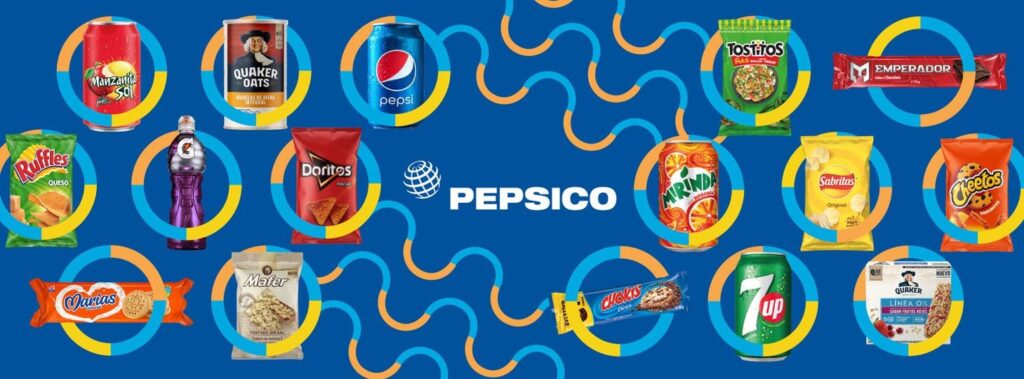PepsiCo’s acquisitions have played a significant role in shaping its diverse portfolio of brands.
Its numerous acquisitions throughout its existence are part of its strategic expansion and diversification efforts. The company has consistently sought to broaden its product portfolio, enter new markets, and stay competitive in the dynamic global food and beverage industry.Here is a detailed overview of some of the notable brands and companies that PepsiCo has purchased throughout its history:
- Frito-Lay, Inc. (1965):
- Acquisition Details: PepsiCo’s merger with Frito-Lay in 1965 marked a pivotal moment in the company’s history. Frito-Lay, known for its snack products, became a division of PepsiCo.
- Brands: Frito-Lay’s portfolio included iconic brands such as Lay’s, Doritos, Tostitos, Cheetos, and Ruffles. This acquisition positioned PepsiCo as a major player in the global snack industry.
- Pizza Hut (1977):
- Acquisition Details: PepsiCo acquired Pizza Hut, a well-known pizza restaurant chain, in 1977. This move marked PepsiCo’s entry into the restaurant and fast-food industry.
- Impact: The acquisition of Pizza Hut laid the groundwork for PepsiCo’s expansion into the restaurant business, setting the stage for further acquisitions in this sector.
- Taco Bell (1978):
- Acquisition Details: In 1978, PepsiCo expanded its restaurant division by acquiring Taco Bell, a popular fast-food chain specializing in Mexican-inspired cuisine.
- Impact: The addition of Taco Bell strengthened PepsiCo’s presence in the quick-service restaurant (QSR) industry, diversifying its restaurant portfolio.
- Kentucky Fried Chicken (KFC) (1986):
- Acquisition Details: PepsiCo continued its foray into the restaurant business by acquiring Kentucky Fried Chicken (KFC) in 1986. KFC is renowned for its fried chicken offerings.
- Impact: With the addition of KFC, PepsiCo became a major player in the global fast-food industry, further expanding its restaurant division.
- Tropicana Products, Inc. (1988):
- Acquisition Details: PepsiCo acquired Tropicana, a leading producer of orange juice, in 1988. This strategic move strengthened PepsiCo’s presence in the beverage sector.
- Brands: Tropicana is known for its diverse range of fruit juices, including Tropicana Pure Premium and Tropicana Twister.
- The Quaker Oats Company (2001):
- Acquisition Details: In 2001, PepsiCo made a significant acquisition by purchasing The Quaker Oats Company. This move added a variety of well-known brands to PepsiCo’s portfolio.
- Brands: The acquisition included brands such as Gatorade, Quaker Oats, and the popular sports drink Gatorade, enhancing PepsiCo’s offerings in the sports and nutrition segment.
- SodaStream (2018):
- Acquisition Details: In 2018, PepsiCo acquired SodaStream, a company known for its home carbonation products.
- Impact: The acquisition aligned with evolving consumer preferences for customizable and healthier beverages, allowing PepsiCo to tap into the at-home carbonation market.
- Various Regional and Local Brands: throughout its history, PepsiCo has acquired numerous regional and local brands, allowing the company to cater to diverse markets and consumer preferences globally. These acquisitions have included brands in different categories such as snacks, beverages, and healthier alternatives. Here is a comprehensive list of some of the local brands and companies that PepsiCo has purchased:
- Sabritas (Mexico): PepsiCo acquired Sabritas, a Mexican snack company, in 1966, marking an early expansion into the Latin American market.
- Smith’s Snackfood Company (Australia): In 1998, PepsiCo acquired Smith’s Snackfood Company, an Australian snack food manufacturer, to strengthen its position in the Asia-Pacific region.
- Lebedyansky (Russia): PepsiCo acquired Lebedyansky, a Russian juice and dairy company, in 2008, enhancing its presence in the Russian market.
- Wimm-Bill-Dann Foods (Russia): Acquired in 2011, Wimm-Bill-Dann was a major Russian dairy and juice producer, contributing to PepsiCo’s expansion in Russia.
- Hatsun Agro (India): PepsiCo acquired a stake in Hatsun Agro, an Indian dairy company, to enter the dairy and beverages segment in India.
- Sofrito Lays (Dominican Republic): In 2008, PepsiCo acquired Sofrito Lays, a snack company in the Dominican Republic, expanding its footprint in the Caribbean.
- Mabel (Colombia): PepsiCo acquired Mabel, a Colombian cookie and cracker company, strengthening its snack portfolio in Latin America.
- Kero Coco (Brazil): The acquisition of Kero Coco, a Brazilian coconut water brand, allowed PepsiCo to tap into the growing market for healthy and natural beverages.
- Bluebird Foods (New Zealand): PepsiCo acquired Bluebird Foods in 2006, bolstering its snack business in New Zealand and the wider Oceania region.
- Duke’s (India): PepsiCo acquired Duke’s, a popular snacks brand in India, expanding its snack offerings in the Indian market.
- Vitall (Chile): In 2013, PepsiCo acquired Grupo Pepsico Alimentos y Bebidas Vitall, a Chilean dairy and juice company, contributing to its presence in South America.
- Be & Cheery (China): PepsiCo acquired Be & Cheery, a Chinese snack brand, in 2020, strengthening its position in the growing Chinese market.
- Pioneer Foods (South Africa): In 2019, PepsiCo acquired Pioneer Foods, a South African food company, expanding its presence in the African continent.
- Strategic Spin-Offs: while PepsiCo has been actively acquiring companies to expand its portfolio, it has also strategically spun off certain divisions to streamline its focus:
- Yum! Brands (1997):
- Spin-Off Details: In 1997, PepsiCo spun off its restaurant division, creating a separate entity known as Tricon Global Restaurants. Later renamed Yum! Brands, Inc., this spin-off included Pizza Hut, Taco Bell, and KFC.
- Impact: The spin-off allowed PepsiCo to sharpen its focus on its core business of beverages and snacks while giving Yum! Brands the autonomy to operate independently in the restaurant industry.
- Yum! Brands (1997):

PepsiCo’s journey of acquisitions and strategic moves has shaped it into a global conglomerate with a diverse portfolio of brands spanning beverages, snacks, and restaurants. From the early acquisition of Frito-Lay to the expansion into the restaurant industry with Pizza Hut, Taco Bell, and KFC, each acquisition has contributed to PepsiCo’s growth and market presence. The company’s ability to adapt to changing consumer trends, diversify its offerings, and strategically spin off divisions underscores its resilience and strategic acumen in the dynamic landscape of the food and beverage industry.


